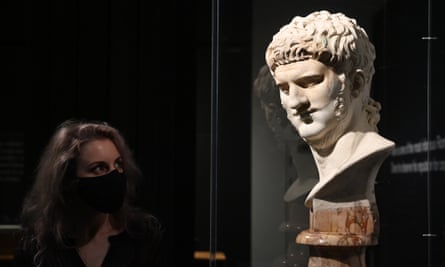For weeks, I’ve been struggling to get hold of new contact lenses. Whether because of Brexit, the pandemic or some other unknown factor, my prescription is always unavailable. This has never happened before and I’ve worn soft lenses since I was 18, when I begged my mother to buy them for me before I went to university, the better that I might espy all the boys I hoped to get off with at a distance.
These days, I don’t mind how I look in my Coke bottles as much as I once did. But even so, I can’t say that I’m happy. My sunglasses are a no-go, ditto my reading glasses. Worst of all, behind my spectacles’ swotty thickness, I feel (ironically) slow-witted and lumbering, as if I’m moving around in thick fog.
In search of consolation, I picked up Through the Looking Glasses, a new book by the groovy cultural historian Travis Elborough, in which he tells the long and often quite strange story of spectacles. It’s fascinating.
I now know, for instance, that the earliest evidence of glasses for shortsightedness can be found in Italian ducal documents dating from 1451 and that there were still auctions of the shells of Atlantic hawksbill sea turtles (used to make, among other things, “tortoiseshell” frames) in London in 1939.
Elborough notes that myopia is on the rise. In the UK, twice as many 10- to 16-year-olds (one in five) are shortsighted than 50 years ago. In 2012, a study of 19-year-old men in South Korea found that an astonishing 96.5% were. Why? One culprit might be the fact that our lives are increasingly lived indoors. Time spent outside may help to protect against the development of myopia, perhaps because light stimulates the release of dopamine in the retina, preventing the overgrowth of the eye that leads to it.
Kids, you have been warned. Leave your bedrooms immediately in the knowledge that by doing so, you may go on being able to read your endless stream of Snapchat messages.
Emperor Osborne?

Having been appointed chair of the trustees of the British Museum, there’s talk of the role that George Osborne, formerly David Cameron’s austerity chancellor, will play in helping the institution to reach “ever larger” audiences. Hmm. In 2002, I was dispatched to report on the state of the Conservative party under the disastrous leadership of Iain Duncan Smith. What was to be done with it? Who had any answers?
Osborne, then the youngest Tory MP, talked to me in his car outside a school in his constituency in Tatton, Cheshire. He agreed that things were bad. Its members, he told me, were too old: “What the party needs, Rachel, is people like you…” There was a brief pause while I sat to attention, wondering what on earth he could mean and whether I should be flattered or horrified. Then, full throttle, he said it: “Ordinary people.” Still, his famous Caesar-style haircut of 2013 will be just right for the Roman Gallery.
Fake grass sucks

When, if ever, will government or local councils outlaw artificial turf? In lockdown, sales of the stuff apparently shot up (even before the pandemic, 8m sq m of it were sold every year). This is madness. Real grass absorbs carbon dioxide and supports the insect population; fake grass ends up in landfill. But these aren’t the only reasons I hate it. Owners spend their evenings proudly vacuuming their phoney expanses of green as if they were carpet, a noise almost as annoying as that of a high-pressure hose or a leaf blower.





More Stories
The Best Furniture from Castlery’s Cyber Monday 2022 Sale
How to Store Propane Tanks to Maintain Their Longevity
Reese Witherspoon Colorfully Matched Her Christmas Tree With Her Rainbow Bookshelf